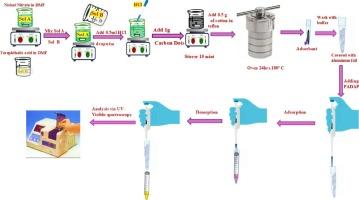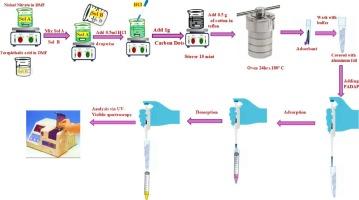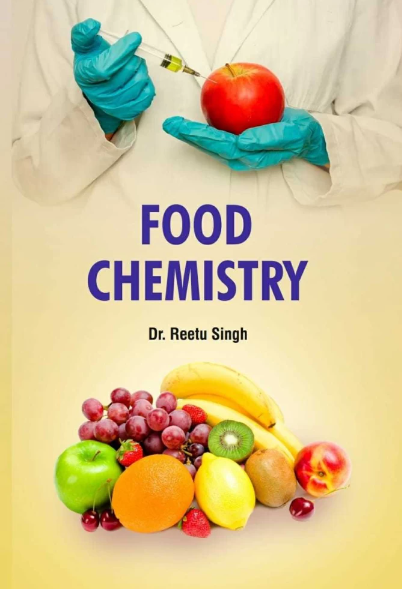Polystyrene foam-based pipette-tip Micro-solid phase extraction (PFPT-μSPE) using Ni-MOF@S-CQDs nanocomposite: A novel method for efficient extraction of Lead from water and food samples
IF 9.8
1区 农林科学
Q1 CHEMISTRY, APPLIED
引用次数: 0
Abstract
A novel Ni-MOF@S-CQDs nanocomposite was synthesized directly into the pores of a polystyrene foam. It was characterized using FTIR, XRD, SEM, and SEM-EDX techniques. The adsorbent was effectively applied for the extraction of Pb (II) from water, juice, and iced tea samples, followed by analysis using UV-VIS spectrometry. Various analytical factors, including pH, adsorbent amount, adsorption and desorption times, and sample volume, were studied. Under the optimum conditions, the analytical features were obtained; the LDR of 50–5000 μg L−1, the LOD of 15 μg L−1, and the RSDs% of 2.0 and 4.0 for intra-day and inter-day, respectively. The preconcentration (PF) and the enrichment (EF) factors of 30, the factor of 28.5, and the extraction efficiency (EE) of 95 % were obtained. Certified reference materials (CRMs) were used to validate the novel Polystyrene Foam-Pipette Tip Micro-Solid Phase Extraction (PFPT-μSPE) technique. This study is eco-friendly, accurate, and economical for the extraction of Pb (II) from water and beverage samples.


基于Ni-MOF/S-CQDs纳米复合材料的聚苯乙烯泡沫吸管-微固相萃取(PFPT-μSPE):一种高效提取水和食品样品中铅的新方法
在聚苯乙烯泡沫塑料的孔中直接合成了一种新型Ni-MOF/S-CQDs纳米复合物。采用FTIR、XRD、SEM和SEM- edx技术对其进行了表征。该吸附剂有效地应用于水、果汁和冰茶样品中的铅(II)的提取,并用紫外可见光谱法进行分析。考察了pH、吸附剂用量、吸附和解吸次数、样品体积等分析因素。在最佳条件下,得到了分析特征;LDR为50 ~ 5000 μg L−1,LOD为15 μg L−1,日内和日间rsd %分别为2.0和4.0。获得了富集因子(PF)为30,富集因子(EF)为28.5,萃取效率(EE)为95 %。采用标准物质(CRMs)对新型聚苯乙烯泡沫微固相萃取(PFPT-μSPE)技术进行了验证。本研究从水和饮料样品中提取铅(II)具有环保、准确和经济的特点。
本文章由计算机程序翻译,如有差异,请以英文原文为准。
求助全文
约1分钟内获得全文
求助全文
来源期刊

Food Chemistry
工程技术-食品科技
CiteScore
16.30
自引率
10.20%
发文量
3130
审稿时长
122 days
期刊介绍:
Food Chemistry publishes original research papers dealing with the advancement of the chemistry and biochemistry of foods or the analytical methods/ approach used. All papers should focus on the novelty of the research carried out.
 求助内容:
求助内容: 应助结果提醒方式:
应助结果提醒方式:


